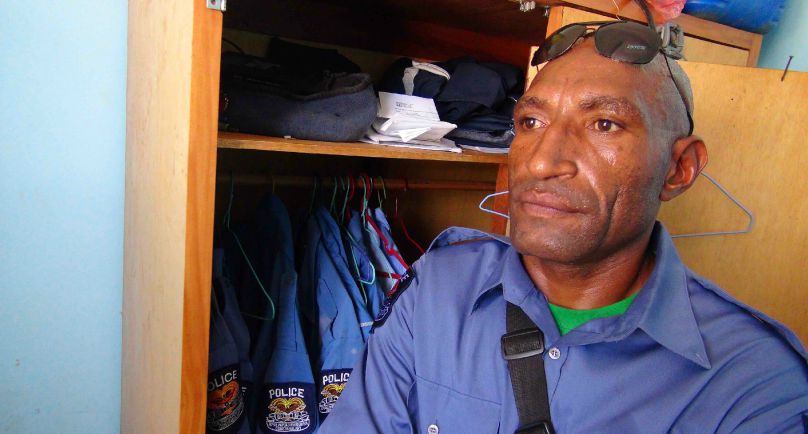by Scott Waide – EM TV News, Lae
In a tiny office space on the ground level of the Madang Town police station, Constable Gideon Seri Ati, points to a wardrobe with a broken door.
“This is where I keep my personal belongings,” he says. “My uniforms, pillows and other clothes.”
Constable Ati is in the Madang Police Public Safety Section. The tiny room doubles as his home and office.
“There are two other officers who use this office. When they go home, this becomes my house. ”
While the young constable has smile on his face as he talks about his personal challenges, it masks the seriousness of Madang’s police housing problem. His wife and young child live in Goroka because of the lack of accommodation in Madang.
He has been living here for the last eight months since moving out of a friend’s home in Madang.
“Sometimes, you don’t want to be in the way when your friend’s family have their problems to sort out,” he says again an ever present grin.
Constable Ati cooks his meals after hours away from public view beside a fence where police dogs are kept. The fence is where he hangs his uniforms up to dry.
“This is where the government sent me to work so I can’t complain. There are other senior officers who live in settlements and come to work.”
In the last five years, Madang’s ballooning population has outpaced the Royal Papua New Guinea Constabulary’s ability to maintain law and order. The police force is short staffed and it is plagued by an embarrassingly chronic housing problem.
The Madang town police station and the men and women who work within it are central to law enforcement. But their welfare and housing has been an issue that has been debated and largely ignored over the last 10 years.
Madang’s Provincial Police Commander, Sylvester Kalaut, admits that staff morale is at an all time low and officers are working an average of 16 hours a day with limited rest time.
“For me as Provincial Police Commander, it doesn’t make me feel good at all to see my men and women live in settlements and in our offices.
“We have been promised 30 houses. But as far as I know, the process of awarding contracts is now with the Central Supply and Tenders Board (CSTB).”
At the town’s waterfront, onboard the old Lutheran Shipping vessel, the Mamose, another policeman, Constable Elimas Boni, has made one of the ship’s cabin his home. In February he moved in with his family. Last week, his wife and children left him.
“Because of the frustration caused by the difficulty of living here, my wife and children packed up and left,” he says.
Constable Boni is attached with Criminal Investigation Directorate (CID). Constable Boni is a casualty of district priorities. He was evicted from his previous residence at Transgogol outside of Madang Town and forced to move into town after the district decided to move another government officer into the house he was occupying.
Constable Boni has now been forced to squat on a ship undergoing maintenance.
Madang’s police housing problem, is not a new issue. It has dragging on for a decade. Each time, the housing problem is raised, there are immediate promises of a solution and no visible action.
Madang is just the tip of a massive police housing crisis. Eight families continue to live in the condemned Kusbau police barracks 10 years after provincial health inspectors declared it unsafe for human habitation.
In Lae’s Bumbu police barracks, there are duplexes that stand incomplete after more than a year. The Police Minister, Robert Atiyafa, who inspected the duplexes promised an investigation that has not yet begun.


